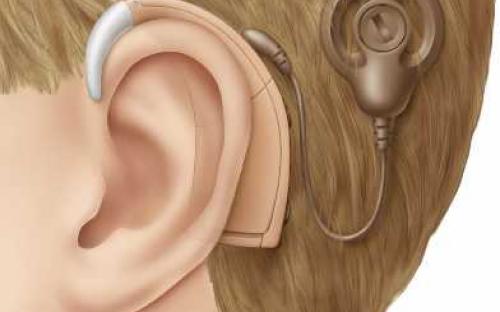
- Home
- DescriptionNews
NHSO provides access to hearing loss and vision problem treatment
.jpg)
NHSO provides access to hearing loss and vision problem treatment
Dr Jadej Thammatacharee
Secretary-General of National Health Security Office (NHSO)
Many people believe that hearing loss in children is uncured. Partly because the treatment is costly and inaccessible, especially for parents from low-income families.
The cost of treating a child includes obtaining a cochlear implant, a small electronic device that electrically stimulates the cochlear nerve.
The device is priced between 400,000 and 800,000 baht depending on its quality.
On the other hand, parents will need to pay extra for a surgical procedure to insert the implant electrodes into the child’s cochlea, the device’s maintenance, and training to help the child learn to interpret the signals received from the device.
The incurred cost throughout the treatment forces many parents to give up on seeking medical assistance for their children.
As a result, these kids have a rough path throughout their first five years, which is a vital time for child development.
Hearing ability is important for developing speech and language skills, and cognitive and emotional development.

The lack of hearing ability will affect children’s educational performance, leading to limited capacity when entering the labor market in adulthood.
The good news is that treating hearing loss is possible.
Some research shows that treating it before a child reaches six months of age will result in significant improvement in child development outcomes when compared to those untreated.
The main challenge lies in the inaccessibility of high-cost treatment.
Solving this challenge requires a healthcare policy that ensures access to hearing loss treatment regardless of children's family backgrounds.
As an organization managing Thailand’s biggest healthcare scheme, Universal Coverage Scheme (UCS), the National Health Security Office (NHSO) has played a significant role in initiating the policy to improve children’s health and wellbeing.
In 2020, our board chaired by the Public Health Minister had the resolution to include rechargeable cochlear implants for children under the age of five in the UCS benefits package.
The decision is based on the academic studies that confirm the high benefits and cost-effectiveness of providing children with early treatment for hearing loss.
Access to the treatment does not just improve the quality of their lives. It also improves their performance and productivity which will be valuable to the society and economy.
Since 2021, we have begun delivering cochlear implants to children in our target group, by collaborating with public hospital staff who obtain health records of children with hearing loss.
It is estimated that around 1,200 newborn babies, or 0.2% of more than 600,000 babies born in Thailand each year, risk having hearing disabilities.
Nearly 3% of this risk group, or 33 children, likely have serious hearing problems and require cochlear implants.
The NHSO has allocated an 18-million-baht budget for purchasing the devices each year, as well as covering the cost of surgery, children’s training, and their travel fees to the hospitals.
However, we faced the challenge of the COVID-19 pandemic last year, which disrupted the health services across the country and the globe.
We were able to deliver the devices to three children despite our target of 30.
As the health crisis is relieved this year, we plan to campaign for this benefit and encourage parents to take their children, especially newborn babies, to test their hearing ability.
If the tests show serious hearing problems, parents can request full treatment for their kids.
Along with benefits relating to hearing loss, the NHSO also provides children with other benefits, including eye tests that help ensure positive child development outcomes.
Vision problems in children affect many aspects of intellectual development, including language learning, interaction with people, and social skills.
Parents and teachers may not detect the problems because young children are commonly unaware of their eyes’ flaws, which usually emerge when they reach the age of 1.5 to four.
Therefore, early access to eye tests can help the gradians identify their kids’ vision problems and provide them with glasses, which will help them learn and develop skills.
The NHSO has covered the cost of eye tests and glasses while finding relevant activities at schools.
For example, school staff may invite health staff to provide eye tests to all students since they are in grade one. This activity helps teachers and parents early detect vision problems in children.
If the tests confirm vision problems in children, hospital staff can send the glasses to the children via schools.
Offering eye test at schools are highly beneficial, especially in remote areas where traveling to hospitals is not an easy choice for parents.
These are a few examples of UCS benefits for children. There are many more, including free vaccines, child development tests, and treatment for intellectual disabilities.
We are aware that ensuring children’s good health, especially in their early years, is a worthwhile investment.
Good health does not just improve their outcomes. It also helps them live happily while giving them the chance to explore their potential fully.

